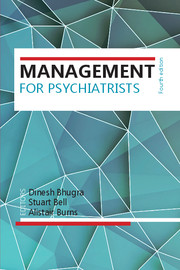Book contents
- Frontmatter
- Contents
- List of contributors
- List of figures, tables and boxes
- Preface
- Part I Theoretical overview
- Part II Changes and conflicts
- 11 Medical leadership skills: what is needed to be a successful leader?
- 12 Understanding systems
- 13 Working with the team
- 14 Managing multicultural and multinational teams in healthcare
- 15 Management of change
- 16 Managing the psychiatrist's performance
- 17 Revalidation for psychiatrists
- 18 Quality improvement tools
- 19 Quality and quality governance
- 20 Measurement of needs
- 21 Service users’ expectations
- 22 Clinical audit
- 23 Confidentiality and management in healthcare organisations
- 24 Patient complaints: every doctor's business
- 25 Mental health review tribunals. Or, tribunals, and how to survive them
- Part III Personal development
- Index
25 - Mental health review tribunals. Or, tribunals, and how to survive them
from Part II - Changes and conflicts
Published online by Cambridge University Press: 02 January 2018
- Frontmatter
- Contents
- List of contributors
- List of figures, tables and boxes
- Preface
- Part I Theoretical overview
- Part II Changes and conflicts
- 11 Medical leadership skills: what is needed to be a successful leader?
- 12 Understanding systems
- 13 Working with the team
- 14 Managing multicultural and multinational teams in healthcare
- 15 Management of change
- 16 Managing the psychiatrist's performance
- 17 Revalidation for psychiatrists
- 18 Quality improvement tools
- 19 Quality and quality governance
- 20 Measurement of needs
- 21 Service users’ expectations
- 22 Clinical audit
- 23 Confidentiality and management in healthcare organisations
- 24 Patient complaints: every doctor's business
- 25 Mental health review tribunals. Or, tribunals, and how to survive them
- Part III Personal development
- Index
Summary
The Mental Health Act 1959 revised the procedures for admission to psychiatric hospitals and was intended to strengthen the rights and safeguards afforded to people with a mental disorder. In so doing the 1959 Act heralded the introduction of the Mental Health Review Tribunal (MHRT). The purpose of the MHRT was to independently review the cases of those patients detained under the Mental Health Act and subject to guardianship. What transpired was perhaps a less robust safeguard than was intended. Only patients admitted under the long-term provisions of the Act were eligible to apply to the tribunal; the onus was then on patients to demonstrate that they did not justify detention, and only unrestricted patients had the right of appeal; there were also other procedural issues which disadvantaged the patient. With the advent of the Human Rights Act 1998 the burden of proof is now no longer on the applicant (Mental Health Act 1983 (Remedial) Order 2001, SI 2001/3712) and although successive governments have arguably pursued an agenda of increased control of those with mental disorders, the concept of patients’ rights and advocacy has received considerably more purchase with the Mental Health Act 1983 and Mental Health Act 2007.
Following on from this, there have been significant structural and procedural changes to the MHRT introduced by the Tribunals, Courts and Enforcement Act 2007. In November 2008 the MHRT became part of a new two-tier tribunal structure: the First-Tier Tribunal (FTT) and the Upper Tribunal (UT), which has appeal functions. In England the title for the MHRT is now the Tribunal Service (Mental Health), while Wales continues with the title Mental Health Review Tribunal for Wales, but for simplicity both will be referred to as ‘the tribunal’. The rules governing the tribunal differ between England and Wales and are complemented by practice directions that set out what statements, information, documents and reports must be provided for cases.
In considering the role of the tribunal, the Care Quality Commission (2015) reported 58 399 uses of the Act in the year 2014/2015.
- Type
- Chapter
- Information
- Management for Psychiatrists , pp. 362 - 374Publisher: Royal College of PsychiatristsPrint publication year: 2016



